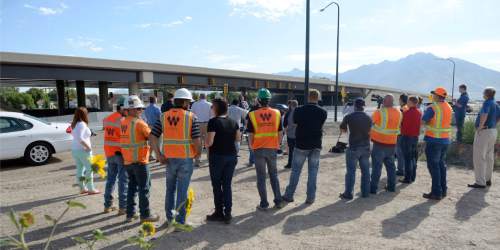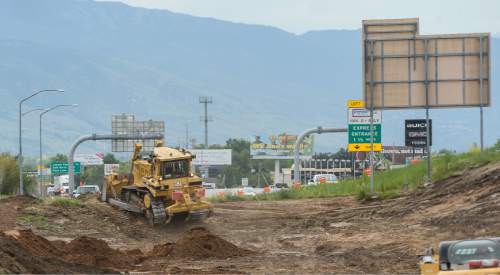This is an archived article that was published on sltrib.com in 2016, and information in the article may be outdated. It is provided only for personal research purposes and may not be reprinted.
A lack of oversight by the Utah Department of Transportation allowed 109 unsafe signs to be installed in Tooele County and another dozen dangerous signs to be put up along Bangerter Highway.
The failure to catch the signs before so many were installed was just one of a number of instances of inadequate oversight of contractors and insufficient budgetary checks outlined in a pair of legislative audits released Tuesday.
The 109 signs a contractor installed along State Road 36 didn't meet UDOT's requirement that they have a breakaway 2½ inches from the ground in case they're struck by a car. And along the south end of Bangerter Highway, roughly a dozen signs were installed too close to the road's edge or didn't meet the department's height requirement.
The contractor had to fix the problem, but auditors said UDOT should have caught the problems before so many improper signs were installed, calling into question the department's oversight of contractors.
The legislative auditors also recommended the department beef up its oversight of the money it transfers to cities and counties for local road projects and do a cost-benefit analysis of its use of outsourcing and hiring consultants instead of hiring in-house employees.
Last year, UDOT transferred $126 million to local projects, but isn't doing any independent audits or checks that the cities and counties are spending the money appropriately, instead just relying on the localities to report their activities to the state auditor.
The department is also relying increasingly on outside consultants instead of hiring in-house employees, even though the consultants sometimes cost nearly three times as much to do the same job.
Total consulting costs ranged from $79.3 million in 2014 to a high of about $129 million in 2011.
"Several mid-level managers said they would like to replace some consultants with full-time employees not only for the cost savings, but also for the convenience of having an employee readily available who does not have to wait for a contract to be signed," the audit said. "One manager said that when they use consultants, they 'put down less asphalt.' "
The department has also increased its outsourcing of some parts of its mission. For example, the audit looked at the cost of lawn mowing in UDOT's Region 2, which nearly tripled since UDOT began contracting it out to a Florida company in 2013.
UDOT Executive Director Carlos Braceras said that lawn mowing is seasonal work and it makes sense to contract for the one month a year they need the work done.
"If I were to staff for every activity I need to do I would have periods of time where I'd have folks sitting around more often," he said. Additionally, there is more vital work for the full-time staff to be doing. "We have maintenance folks who could be doing mowing cheaper but are actually out doing inspections. We try to assign our employees to higher-risk elements."
Braceras said the department supports the idea of doing cost-benefit analyses for its consulting and contracting work, but he expects it may not change how the department actually operates.
"We have not done a very good job of documenting what we have intuitively felt" is best, Braceras said, but the studies might validate and justify those decisions.
A second audit recommended giving UDOT latitude to consider a bidder's past performance on road projects when the department awards contracts for new projects; beefing up its internal audits to comply with the requirements of the law; and assessing the rates it charges agencies to use state airplanes, which currently are subsidized by taxpayers and primarily benefit out-of-state hospitals when doctors from the University of Utah are flown to other states to assist in procedures.
gehrke@sltrib.com Twitter: @RobertGehrke





